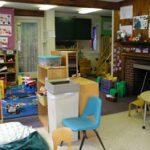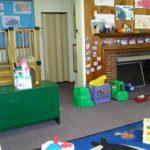Toddlers learn best by exploring the environment through their senses. Toddlers enjoy lots of free choice and like moving about the setting, observing and making social contacts. Children at this age are learning about independence and self-help skills such as toileting, feeding, and dressing. Toddlers need ample opportunities to practice new skills through repetition and experience with success. Most of all, they need time to be themselves in a setting free of stress, enabling them to feel positively about all new things they are learning.
The Toddler Program respects the characteristics of the toddler. The environment is planned to encourage young children to use real materials and playthings to learn about themselves, while also promoting imaginative play. Imitation, planned play activities, and numerous choices enable the toddler to become increasingly more independent. The Center strongly encourages language interaction. The environment is planned with appropriate developmental activities such as books, simple puzzles, water and sand play, music, indoor and outdoor exploration and movement, and creative inquiry with a rich variety of activities, objects and people. If weather and outdoor conditions permit, we will be outside twice a day.
The Toddler Program works to develop routines that fit the individual needs of young children. Teachers work closely with parents to parallel parent and child practices in the area of toileting, feeding, and dressing. Parents provide the necessary toileting materials such as diapers and wipes. Children will be given the opportunity to rest every afternoon. Parents will also be asked to provide a blanket, crib sheet, and pillow to be brought home at the end of each week to be laundered.
Each family must work closely with the teachers to establish healthy feeding routines. Parents will provide two snacks, lunch and bottles (when necessary). Milk is provided with snacks and lunch. The toddler teachers work closely with parents to assure a safe and healthy environment for each child.
Hours: 7 a.m. to 5:15 p.m.
Ages: 1 year 1 month – 1 year 10 months (ages as of August 31)
Group Size: 10 children maximum
Ratio: 1 adult to 3 children




Intended for the child who is no longer a toddler, yet is still developing language and motor abilities, the Early Preschool program stresses language interaction and the development of appropriate level of independence. Children engage in activities such as dramatic play, storytelling, puppets, blocks, puzzles, water and sand play, exploration with art media, climbing, and body movement and awareness. The children have many opportunities to play alone and in a group, and to share and listen to stories. Children in the Early Preschool program are learning to explore the world around them through sensory activities and concrete learning experiences. Children have opportunities to solve problems and learn about making decisions. If weather and outdoor conditions permit, we will be outside twice a day. In addition, walking trips, which give children a chance to observe and learn about their community, are an important part of the program.
Children in the Early Preschool program have opportunities to demonstrate and practice newly developed self-help skills. Social skills, such as fostering new friendships and learning to deal with conflicts among friends, are modeled and encouraged by the teachers. While working on sharing, the children also have things and places of their own to care for at the Center. They are encouraged to persist at self-chosen tasks and activities and to make choices at different play centers. The children have the opportunity to interact with Plymouth State University students who plan developmentally appropriate and meaningful activities.
Children bring their own lunch and 2 snacks per day. Milk and water is provided for snacks and lunch.
The teachers communicate regularly with parents. They seek to understand home expectations and to work with parents in the best interests of the child.
Hours: 7 a.m. to 5:15 p.m. Monday through Friday
Ages: 1 year 11 months – 2 years 10 months (ages as of August 31)
Ratio: 1 adult to 4 children
Group Size: 12 children maximum





Preschoolers enjoy a greater variety of experiences and an increasing number of small-motor activities such as cutting, art, manipulatives, and cooking. They enjoy developing new knowledge with colors, shapes, and size, and working on basic math and science concepts and problem solving. The developmentally appropriate activities planned consider individual differences in abilities and interests, as well as learning styles. Children work individually and in small and large groups.
Children are provided with concrete learning activities with diverse materials and people. The environment is planned for children to learn through active exploration. The daily schedule enables children to be physically and mentally active while following a routine and making free choices throughout the day. The curriculum involves language interaction through books, storytelling, puppets, book-making, dramatic play, math, blocks, games, puzzles, computer activities, recordings, music, and art.
Children have many opportunities to explore the Plymouth State University campus and enjoy the rich cultural and library facilities. If weather and outdoor conditions permit, we will be outside at least twice a day. In addition, walking trips, which give children opportunities to observe and learn about their community, are an important part of the program. The children have the opportunity to interact with Plymouth State University methods and practicum students who plan developmentally appropriate and meaningful activities. Teachers work closely with families to share ideas for activities at home and in the community.
Children bring their own lunch and two snacks per day. The Center provides milk for lunch and snack.
The teachers communicate regularly with parents. They seek to understand home expectations and work with parents in the best interests of the child.
Hours: 7 a.m. to 5:15 p.m. Monday through Friday
Ages: 2 years 11 months – 3 years 10 months (as of August 31)
Group size: 18 children maximum




The PreK program of the Center for Young Children and Families is a full-day program, five days a week. Each day the children are given many opportunities to see how language, reading, and writing are all parts of communication. Children engage daily in activities focusing on language and literacy through meaningful experiences such as listening to and reading stories and poems, experimenting with reading and writing and participating in dramatic play. If weather and outdoor conditions permit, we will be outside twice a day.
Children are encouraged to problem solve with math concepts, to ask questions, and to be involved with scientific inquiry and discovery. The curriculum involves interaction with real objects while seeking solutions to concrete problems in math and science. The PreK program focuses on social skills to enable the children to address interpersonal problems, learn to cooperate, understand another person’s point of view, and help and negotiate with other children and adults. Children also have opportunities to learn about the Plymouth community and the wider world through social studies explorations and through the Project Approach to learning.
Learning is integrated with appropriate participatory developmental activities that include, but are not limited to, music, art, cooperative games, cooking, blocks, and sensory exploration. Routines are followed, enabling children to enjoy learning in a positive self-concept. As in all of the Center programs, health and safety are priorities. Families provide children with two snack and lunch each day. Milk for snacks and lunch are is provided by the Center. Children are involved in cooking activities on frequent occasions, to learn about nutrition firsthand.
The Plymouth State University campus is rich in resources for the PreK program. The children have many opportunities to participate on campus in music, art, and physical education activities. The children also go on frequent visits to the campus and local public libraries. Teachers work closely with parents to share learning activities and involve them in the PreK environment.
Hours: 7:00 a.m. – 5:15 p.m. Monday through Friday
Ages: 3 years 11 months – 4 years 10 months (as of 8/31)
Group Size: Up to 18 children
Ratio: 1 adult to 6 children





